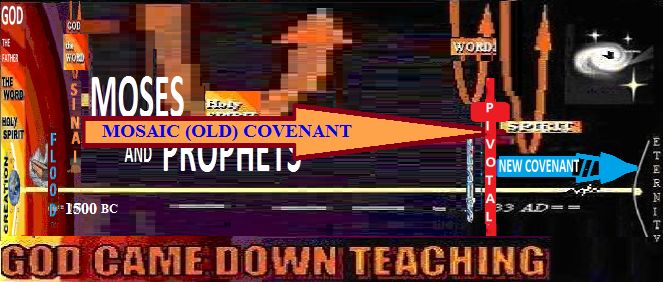GOD'S MARRIAGE LAWS
DOWN THROUGH THE AGES
series"MARRIAGE ON THE MOUNTAIN":
COVENANTS
There are principles for marriage of male and female approved by God from both the beginning and the fall that have continued. They are reconfirmed as applicable in successive eras and covenants.
"Study to shew thyself approved unto God, a workman that needeth not to be ashamed, rightly dividing the word of truth" (2 Timothy 2:15).
God's laws and promises originate from Him by means of covenants given to men through His prophets. "Long ago, at many times and in many ways, God spoke to our fathers by the prophets, but in these last days he has spoken to us by his Son, whom he appointed the heir of all things, through whom also he created the world" (Hebrews 1:1-2, ESV2011). Any of God's laws concerning marriage are given in God's covenants.

When the Bible in the "Old Testament" speaks of God (deity), Jesus is included (John 1:1-3; Genesis 1:1, 26; Hebrews 1:1-3) as the "Word." That means that Jesus as the Word is the co-author of the Old Testament as well as the New.
God has made a series of covenants with mankind. All were made according to His pleasure according to Ephesians 1.
"Having predestinated us unto the adoption of children by Jesus Christ to himself, according to the good pleasure of his will" (Ephesians 1:4,5).
COVENANT BEFORE THE FALL
Creation. Marriage is instituted in creation. Man and woman required duty to marry and bear children. Duration: eternity with tree of life.
God created man (anthropon, singular in Greek LXX, Genesis 1:27) as male and female at the very beginning. This oneness in innocence was forever and ever with the tree of life to feed them. Their rebellion against God's command was sin. Sin separated them from the tree of life. So "forever" was not to be.
COVENANT AFTER FALL
Curse of sin. Marriage is modified by the curse of sin. The curse of sin brought pain upon pain and sweat with a harsh environment. It brought death and its termination of marriage. The roles of marriage were defined with the woman being in subjection to the husband while the husband was a provider from the soil. Woman was to suffer in childbearing.
No restrictions on whom to marry. Incest allowed. Cain has to marry his sister. No mention of divorce. They are to be "one flesh." Hardness of heart because of sin. "Every intention of the thoughts of his heart was only evil continually" (Genesis 6:5b, ESV2011; compare to Hebrews 3:8-19).
COVENANT AFTER FLOOD (Genesis 9ff)
Post-Deluge. Marriage is reconfirmed. "Be fruitful, and multiply, and replenish the earth." They are to be "one flesh." The curse of the ground is removed. The history recorded by Moses is understood to be relevant to the Law given through him. A modification of man's role is that now he may provide food from meat but not its blood. During this "Patriarchal period", God initiates divorce by command although without bill of divorce. Incest allowed for a while. Hardness of heart is recognized as continuing (Genesis 8:21).
COVENANT WITH ABRAHAM (Genesis 12)
The covenant of promise and of circumcision is made with the individual Abraham that affects the Messianic promise. Abraham is commanded to put away his second wife Hagar and her offspring because of her behavior towards his first wife and her son Isaac.
COVENANT THROUGH MOSES (Deuteronomy 4:13)
Post-Sinai. This covenant complements that of Abraham's covenant. Roles are reconfirmed by Law. Man reconfirmed as head. Wife is subject to her husband. Incest is forbidden. Marriage partner is restricted per "unclean (thing)." In the New Testament it is called "fornication." Divorce is conditional but defined as including and requiring, unlike the Mesopotamians' codes, a Scriptural cause of "unclean thing" and a written bill of divorcement. Although the male is the one authorized to terminate legally and Scripturally a marriage, he must satisfy his role as husband or initiation is passed from him to his wife if she be neglected by provision of (1) food, (2) shelter, and/or (3) sexual duty. Initially, under the civil and social aspects of the Law of Moses, sexual violations are capital crimes and are not subject to divorce. However, in the Prophets, God extends divorce to include these crimes by what He is doing and will do to sinful Israel because of their unfaithfulness. Hence, what were formerly capital crimes become causes for divorce.
COVENANT WITH DAVID
This is an individual covenant made with David that affects the Messianic lineage. It complements the Covenant of Moses.
Prior to cross. Jesus, in the Sermon on the Mount, reconfirms the moral teachings of the Law. He reconfirms the continued "hardness of heart", clarifies and reconfirms the Mosaic rule for divorce limited to cause with its requirement of a written bill of divorcement. This opposes the Pharisees' invented "oral traditions". Later, Jesus reconfirms to the Pharisees the original purpose of cleaving and "one flesh" of the married state. Rather than condemning divorce as the modern day "Pharisees of oral traditions" declare, Jesus rather attacks anything including Pharisaic teachings that break asunder the sanctity of the marriage union.
NEW COVENANT (Jeremiah 31:31-33; Hebrews 8:8-13)
Post- Cross. With the establishment of the church, the apostles' doctrine reinforces the moral teachings of God. The apostle Paul elaborates on marriage and clarifies its requirements. There is no problem of Paul contradicting Jesus since Jesus spoke before the cross and Paul speaks from the Spirit of Jesus, after the cross, when the new covenant has come into effect.
Moral obligations from the Law are reconfirmed. Love God by worshipping in the authorized manners of looking back to the cross and not towards it as the Old Covenant did. Love your fellowman and fellow-woman which include the six commandments is reconfirmed.
Husband and wife roles are reconfirmed "from the Law" with the emphasis of God's "cleaving" them and they are to be " one flesh." Married couples are to use the Lord and His church as their model. Man is to love his wife as his flesh and to love her like Christ loves the church. The wife is to reverence and submit to her husband as the church does Christ. Jesus and Paul reconfirm the divorce rule from the Law.
God is the same today and forever and does not wince or change to suit man's nature as some would argue.
Conclusion. Jesus reconfirmed marriage rules and divorce because of the "hardness of men's heart" (hearts determined to sin). Jesus and later Paul and Peter in the apostles' doctrine reconfirmed the six love commandments of the Mosaic Ten. This included "defraud not" one's mate in marriage roles and responsibilities.
Gaylon West
Throw
Out the Lifeline

